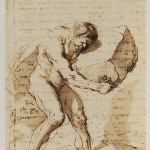Are you interested in the Bachelor's degree programme in Art History?
-
The Study Choice Compass offers prospective students an orientation guide. Among other things, you will find information on the structure and content of the degree programme. In addition, you can solve sample tasks and check your expectations - do your ideas match the subject you want to study? To the study choice compass for prospective students
Where can I apply?
Here you will find information on how to apply and the application form for admission to the 1st semester for Germans, foreign students and EU citizens:
http://www.uni-stuttgart.de/studieren/bewerbung/1fs/
Please apply via the online portal "C@MPUS" by 15 July of the respective year.
The new examination regulations for the Bachelor's degree programme "History of Art" are in effect since the winter semester of 2017/18.
Bachelor's Programme PO 2017
Since the winter semester 2017/2018, the Institute for Art History at the University of Stuttgart has been awarding places on the newly designed Bachelor's degree programme in Art History according to the examination regulations of 2017.
The new study regulations apply to students enrolled in the Bachelor's degree programme in Art History since the winter semester of 2017/2018. The programme is a two-subject Bachelor's degree and can be studied as a major or minor subject.
The degree programme covers the history of European and North American art from the early Middle Ages to the present. The broad range of courses offers an overview of different art genres and theories, artistic techniques and art historical methods, thus providing a comprehensive study of the subject. The study of original works of art - for example in the context of excursions or seminars in museums - has high priority.
A tightly knit cooperation is maintained with the Institute for the History of Architecture at the University of Stuttgart.
The range of courses is enriched by a number of guest lecturers from diverse professional fields who provide an insight into different fields of activity for art historians. Further practical expirience can be acquired in the context of an internship.
The Art History degree programme is composed of a total of 13 modules. In the four basic modules (Introduction to Art History 1; Introduction to Art History 2; Motifs, Iconographies, Source Texts; Language, Texts, Lectures), basic knowledge and methodological skills are acquired. Successful participation is a prerequisite for continuing the degree programme.
The six core modules (Historical Contexts 1; Historical Contexts 2; Historical Contexts 3; Reflection on Methods; Materials, Techniques, Forms of Design; Art and Architecture in the Region) deepen the knowledge of works of art and reflect upon the scientific methods of the subject.
The three advanced modules (genres and media; case studies; exam module) lead towards an exemplary study (Bachelor thesis) in terms of content and methodology.
The standard period of study is 6 semesters.
The programme concludes with the academic degree of Bachelor of Arts. It provides the elementary foundations for subsequent professional activity and offers the subject-specific prerequisites for further research-oriented studies and promotes competences that go beyond the specific subject-related qualifications.
Graduates of the Bachelor of Arts degree programme in Art History as their major subject
- have in-depth skills in scientific research. They are able to reproduce their acquired knowledge in a meaningful structured way in written form.
- have knowledge of several historically, stylistically or functionally related subject areas of art history. They possess an awareness of the problems inherent in the terminological typification of epochs and scientific concepts.
- have an understanding of art historical research questions and are able to summarise and reflect the different research approaches on selected topics. They are able to apply the acquired basic knowledge of art historical methods exemplarily, to discuss methodological questions on the subject and to take a well-founded stance on them.
- possess an understanding of different art genres and media, as well as their historical, procedural, material and medial specifics. They are able to describe works of art using genre-specific terminology and analytical instruments and are able to reflect on technical problems partaining to selected objects.
- have knowledge of important art landmarks in Southern Germany in their historical topographical or museum contexts. Their skills in description, dating and preparatory scientific research as well as in the presentation of this knowledge to an audience in front of the object are well established.
- their historico-critical training, in which written source material plays a decisive role, and their visual-descriptive competence allow them to take up a research-oriented Master's degree programme.
Graduates of the Bachelor of Arts degree programme in Art History as their minor subject
- have in-depth skills in scientific research. They are able to reproduce their acquired knowledge in a meaningful structured way in written form.
- have knowledge of several historically, stylistically or functionally related subject areas of art history. They possess an awareness of the problems inherent in the terminological typification of epochs and scientific concepts.
- have an understanding of art historical issues and are able to summarise and reflect on research problems partaining to selected topics.
The degree programme thus offers a versatile basis for activities in museums, in the art trade (galleries, auction houses), in art criticism and journalism, in cultural management, in the media sector, in the preservation of historical monuments, in libraries and archives, in tourism and in freelance art mediation.
In all of these fields of activity, further qualification by means of an MA programme is recommended.
The prerequisite is the Allgemeine Hochschulreife (general university entrance qualification) as well as proof of knowledge of English and at least one other foreign language. The prerequisite for admission to the Bachelor's thesis also includes proof of the Latinum or comparable knowledge of Latin. If the knowledge of the Latin language is not verified by the university entrance qualification, it can be acquired in the module "Language, Texts, Lectures". The Latinum is not required for the study of art history as a minor subject.
Guidelines
Bachelor of Arts PO 2017
Examination regulations
Examination regulationsModule Handbook
Module Handbooks of the University of StuttgartCurriculum
- Curriculum of the Bachelor's programme in Art History (PO 2017)
As major subject in a combination degree programme
Non-accessible form. If you cannot read the information, write us an email - Curriculum of the Bachelor's programme in Art History (PO 2017)
As minor subject in a combination degree programme
Non-accessible form. If you cannot read the information, write us an email
Other Downloads
Non-accessible forms. If you cannot read the information, write us an email
- Notes on writing a term paper
- Declaration of originality and antiplagiarism
- Application for recognition of examinations and academic achievements not registered with the PA
- Application for the approval of withdrawal from registered examinations and course achievements
Withdrawal form for humanities and social science degree programmes (BA and MA) - Declaration on the submission of the Bachelor thesis
Only for Bachelor of Art History PO 2017 - Request for an extension of a deadline
For submission to the Chairperson of the Examination Committee
Bachelor's programme PO 2008
Between the winter semester of 2008/2009 and the summer semester of 2017, the Institute for Art History of the University of Stuttgart awarded places on the Bachelor's degree programme in Art History according to the old examination regulations of 2008.
Students who pursue their Bachelor's degree according to the PO 2008 (incl. all amendment statutes) can complete their studies according to the old examination regulations (PO 2008) until 30.09.2023. The programme manager, Mr. Reichardt, will be happy to answer any questions.
The possibility to transition from the PO 2008 to the PO 2017 ended on april the 30th of 2018.
Guidelines
Bachelor of Arts PO 2008
Examination regulations
Examination regulations of the University of StuttgartModule Handbook
Module Handbooks of the University of StuttgartCurriculum
- Curriculum of the Bacherlor's programme in Art History (PO 2008)
As major subject in a combination degree programme - Curriculum of the Bacherlor's programme in Art History (PO 2008)
As minor subject in a combination degree programme
Other Downloads
Non-accessible forms. If you cannot read the information, write us an email
- Notes on writing a term paper
- Declaration of originality and antiplagiarism
- Application for recognition of examinations and academic achievements not registered with the PA
- Application for the approval of withdrawal from registered examinations and course achievements.
Withdrawal form for humanities and social science degree programmes (BA and MA) - Declaration on the submission of the Bachelor thesis
Only for Bachelor of Art History PO 2008 - Request for an extension of a deadline
For submission to the Chairperson of the Examination Committee
Contact

Anselm Rau
Dr.Research fellow (History of medieval art)

Gerd Reichardt
Dr.Research fellow
[Image: The Courtauld (Acc.Nr.: D.1952.RW.1366)]

Barbara Reisinger
Dr.Research fellow (History of modern and contemporary art)

